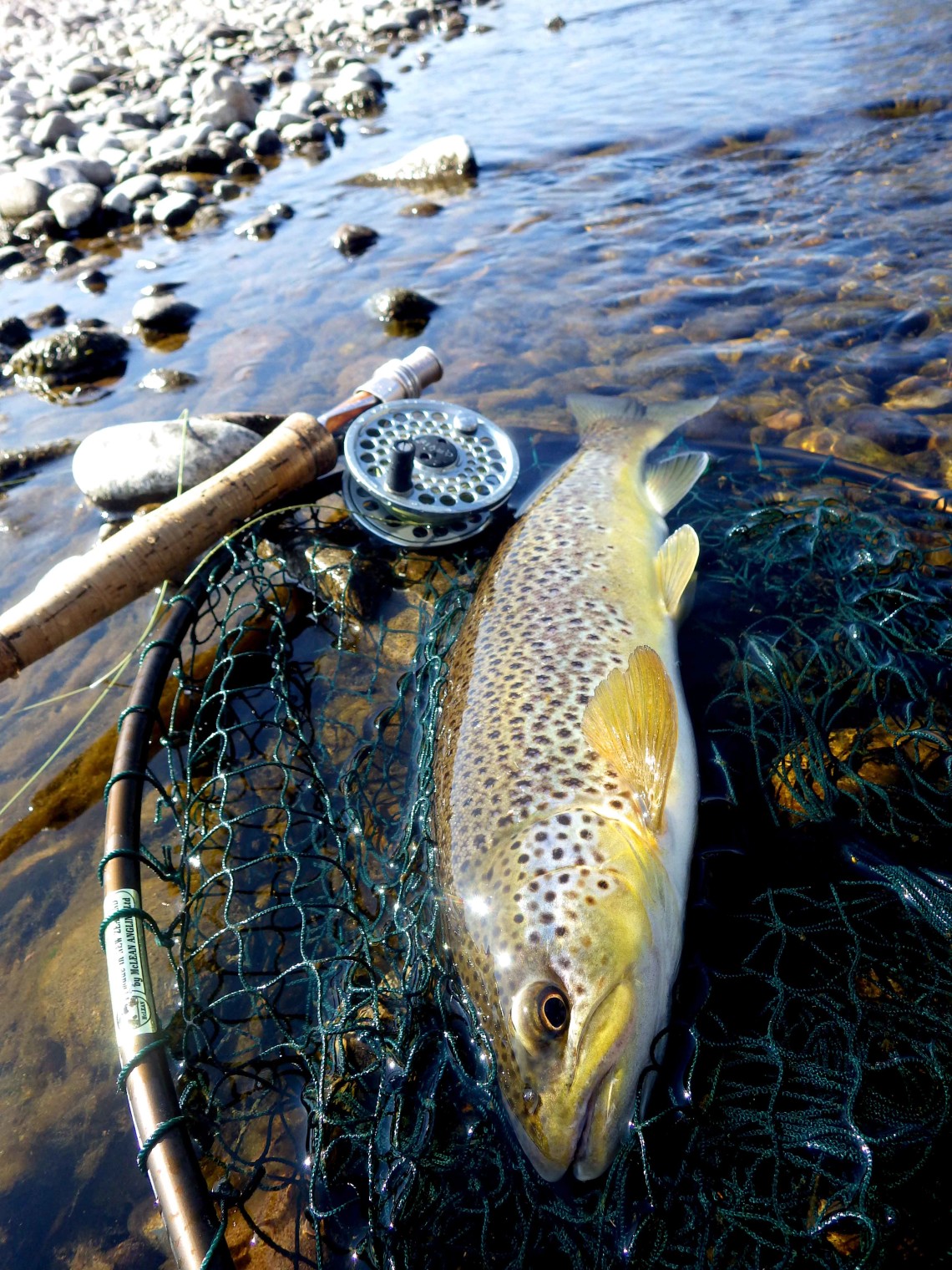A few halcyon days came to charm us at the end of January. The weather was unseasonably warm, the rivers clear and running at medium height, and many of those anglers who turned out for grayling did well. Again we had some larger fish from tributaries, while the main Wye produced plenty of medium-sized grayling ready to grow on as well as the odd big one. Rather sadly however, I saw few salmon or kelts in the Wye, and not too many redds – another indication if it were needed that the stock of migratory fish we received into the river last year was a small one.
On the 24th MH from Llandrindod fished the GPAIAC water at Builth and recorded 7 grayling to 46 cm. Next day CH from Bromsgrove with a friend took 21 grayling on his first attempt at trotting at Abernant. PB from Cheltenham visited the Arrow at The Leen again on the 24th and accounted for 7 grayling to 17 inches while on the 25th CC from Cheltenham fished with the trotting rod at Lyepole and accounted for 24 grayling. Next day JW from Solihull was out on Melyn Cildu, where he found the Irfon now quite low, limiting the number of pools where trotting a float seemed practical. However, from one of them he got 5 good grayling to 2 pounds 4 ounces. “A physically demanding day for those of senior years,” he commented, which I suppose is fair. It’s worth emphasizing that these grayling of 2 pounds weight - and we are seeing quite a number of them this year - are genuinely impressive fish and a reason for celebration. I fear you would not find so many of that size in the classic grayling rivers of Yorkshire these days.
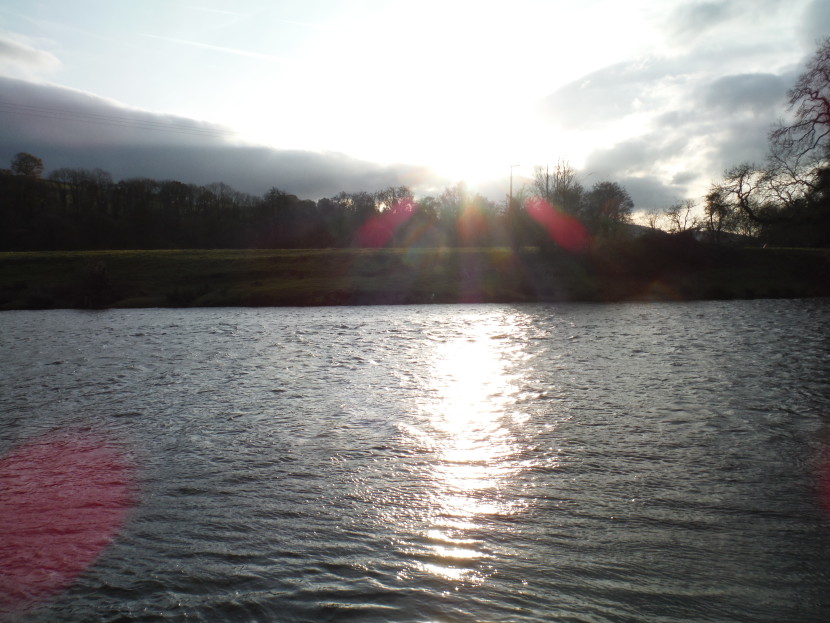 A rare glimpse of sun at Builth
A rare glimpse of sun at Builth 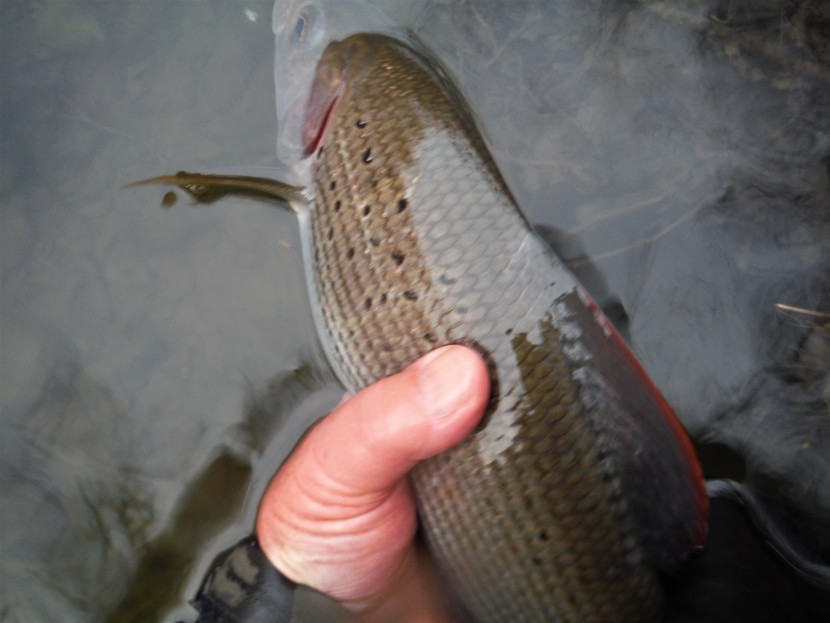 Irfon grayling going back
Irfon grayling going back On the 26th JW from Winscombe took 5 grayling to 2 pounds from the Lugg at Eyton, although he was not able to fish the overgrown top half. MK from London trotted the Arrow at The Leen with red maggots and caught 6 grayling, a pair of which were also over the magic 2 pounds. On the 28th he had 10 more modest grayling to 13 inches from the same beat. LH from Merthyr Tydfil with a friend had 11 grayling from the Monnow Valley fishery on the following day, but doesn’t mention the method used. Meanwhile LH from Hereford caught a pike of 14 pounds from Lower Canon Bridge, while using a fly. CS from Worcester fishing with me at Abernant had 30 grayling using various trotting rods and, by way of diversion, a Tenkara outfit. MK from London was back at the Leen on the 31st and recorded 8 grayling.
 14 pounds Wye pike on the fly - LH from Hereford
14 pounds Wye pike on the fly - LH from Hereford About this time we had news of likely pollution incidents. On the 27th DC from Telford reported some very dirty water flowing through the upper Irfon, which at Melyn Cildu is normally pristine and clear at this time of the year. From the report it wasn’t absolutely clear this was discharging from the sewage plant upstream, which really leaves the matter hanging in the air. At about the same time, we saw a complaint on social media about extremely dirty water flowing from the Olway Brook and running into the lower Usk – again the exact source was not identified. Speed of reaction is everything. If you are the person on the spot, you really should try to identify the source or outfall and if possible photograph it. If you can’t identify the source at the time, it’s unlikely that anybody else is going to be able to later. The number to call NRW about an ongoing pollution incident is 0300 065 3000.
Bad news about the environment seemed to come thick and fast. A dramatic marine incident involving the notorious Margiris factory trawler, now Lithuanian-registered, occurred on the 3rd February off the Atlantic coast of France. The pelagic trawl net split and deposited 3,000 square metres of dead fish on the surface of the sea, photographed by the Sea Shepherd organisation. These were an estimated 100,000 blue whiting, which actually would have been no more than a by-catch for this vessel.
Returning to our modest attempts to catch grayling from local rivers, the fair weather came to an end as heavy rains swept in from the Atlantic. There were a series of these fronts, with very few fishing opportunities between them. On February 5th JT from High Wycombe was caught out by the weather forecast when visiting the Irfon at Melyn Cildu. “Moderate” winds in the mountains of central Wales turned out to be a howling gale driving hail horizontally. After half an hour, fingers frozen, he was forced to give up. I don’t blame him at all for this; it’s easy to under-estimate the amplifying effect of altitude on the weather. Shortly after all our rivers rose in a big flood and fishing had to stop for a while. As levels dropped off again RG of Old Sodbury had 4 grayling on nymphs from Skenfrith at the lower end of the beat. MR from Monmouth had the experience of a predatory trout chasing in a hooked grayling at Monnow Valley. This is more common than you would think; trout love to eat smaller fish. A few chub, pike and barbel were taken on the middle and lower Wye until renewed rain on the 13th and 15th stopped play once more. Now the weather was causing us all real trouble, Storm Dudley being followed by the very powerful Storm Eunice which caused widespread damage. Then came Storm Franklin; the wind and rain seemed endless. For a couple of weeks there was no question of going near the flooded rivers. The one exception was the 26th, when IN from Llanelli managed to extract a splendid 4 pound chub while trotting a very high Irfon at Gofynne.
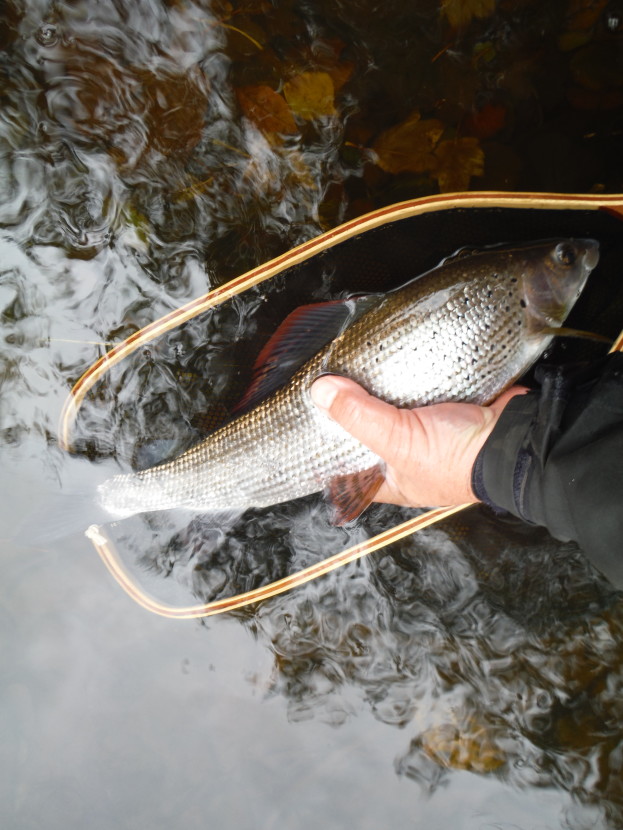 Cammarch Hotel grayling
Cammarch Hotel grayling 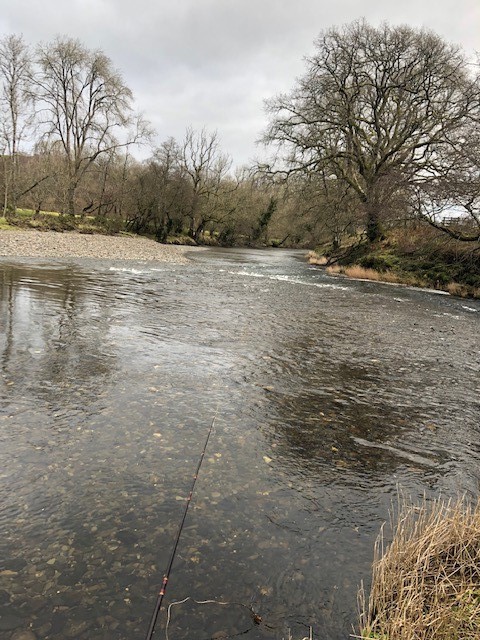 Grayling run, Cefnllysgwynne - TD from Newton Longville
Grayling run, Cefnllysgwynne - TD from Newton Longville 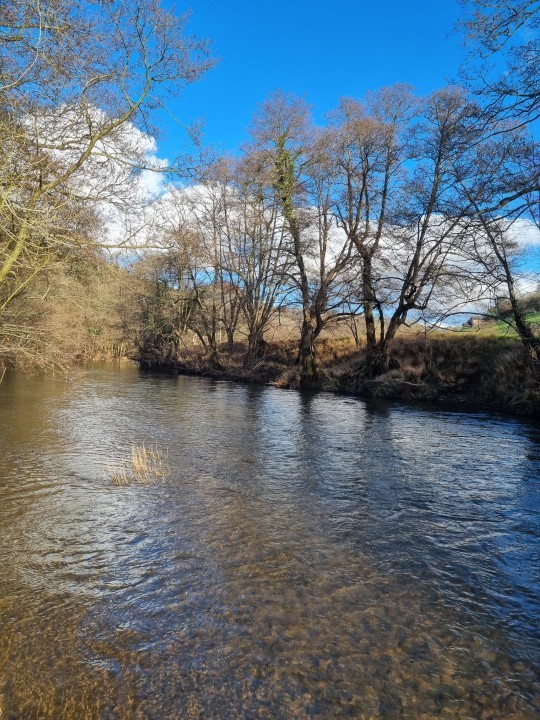 Skenfrith - NG from Yeovil
Skenfrith - NG from Yeovil While we were waiting, there arrived several pieces of good news involving welcome direct action by Natural Resources Wales. Six men from the Brecon and Swansea areas were successfully prosecuted for “stroke-hauling,” or deliberately foul-hooking fish in the Loughor estuary, being fined over 2,000 pounds each. Two more were also successfully prosecuted for poaching salmon from the Usk at Brecon. Amazingly, they were caught because they posted photos of themselves on the internet holding dead salmon. This rather confirms my argument that modern poachers don’t do it to feed their family or due to poverty as some still seem to believe. Those are stories for little children. Rather they poach out of sheer devilment; they actually like to boast about it and all too often they manage to get away with it. Mateusz Kakolewski was fined 2,134 pounds including costs, while Carlos Davies did not show up in court and so a warrant has been issued for his arrest. We also hear that a pig farm alleged to be polluting the Afon Ennig tributary of the Wye (near Talgarth) has been closed following a visit from NRW. This is all the sort of firm action which we hope and expect the environmental regulator to be taking. In another piece of news, we learned that the new by-laws for the Wye in 2022 will include ending the season for migratory fish everywhere on 17th October. The controversial in some quarters “extra week” at the backend for the upper river and tributaries is thus dispensed with.
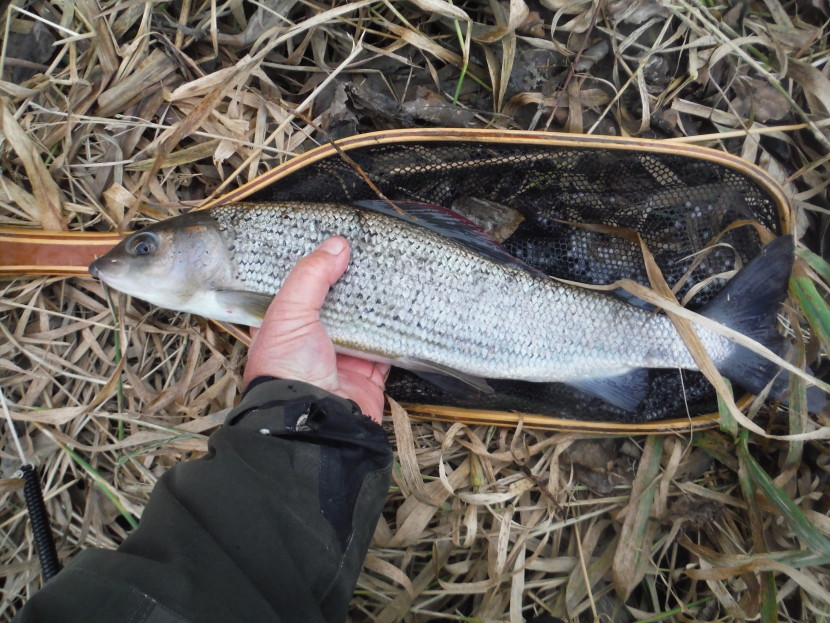 Mid-winter grayling from the Arrow
Mid-winter grayling from the Arrow  The grayling kit
The grayling kit 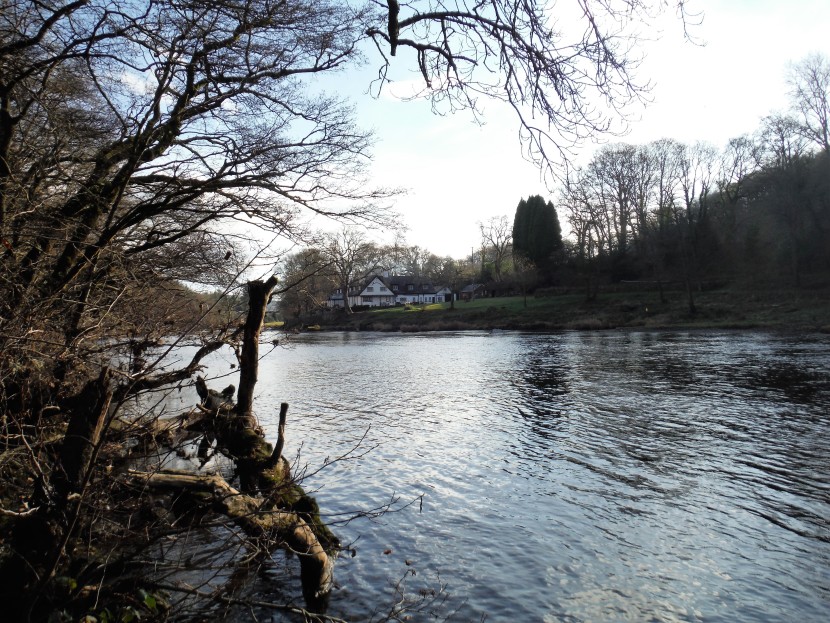 Upper Wye at Pwll y Faedda
Upper Wye at Pwll y Faedda The floods continued right to the end of the month with no fishing to be had anywhere. I spent the final week decorating the inside of our new cottage and covering myself in paint while, like many others no doubt, watching and listening live on TV and radio as Ukraine was invaded. In Slavic languages the word ukraine or kraijna means borderland or marches, and this wheat-growing land of rich black earth historically divided a Catholic West and an Orthodox East. My thoughts on the progress of this new European war will not be very popular, but can be summed up along the lines of: “…how on earth did we get ourselves into this mess?” Leaders in most western nations, particularly our own, spent the first week of the conflict making Churchillian-style speeches displaying a firm resolve to punish Russia for this disgraceful behaviour. Nearly all political leaders of all parties seemed united in this posturing. What all the brave talk actually boils down to is that NATO and the outside world are determined to defend Ukraine to the last Ukrainian soldier. Short of direct military action which almost everybody in the West understands would be unthinkable – Putin has already made the nuclear threat - there will instead be ammunition and the application of sanctions.
There seems to be a touching faith in the power of sanctions and there were in fact criticisms of the EU at times for failing to unite about various sanctions measures. But history should tell us that sanctions short of out-and-out starvation blockades almost never work, and certainly not with a nation like Russia. The fact is that Vladimir Putin does not care much about sanctions because he knows that his people for the most part do not care much about them. What he and they do care about is that Russia should be respected as a world power and this includes respecting what they consider to be its regional interests and security concerns.
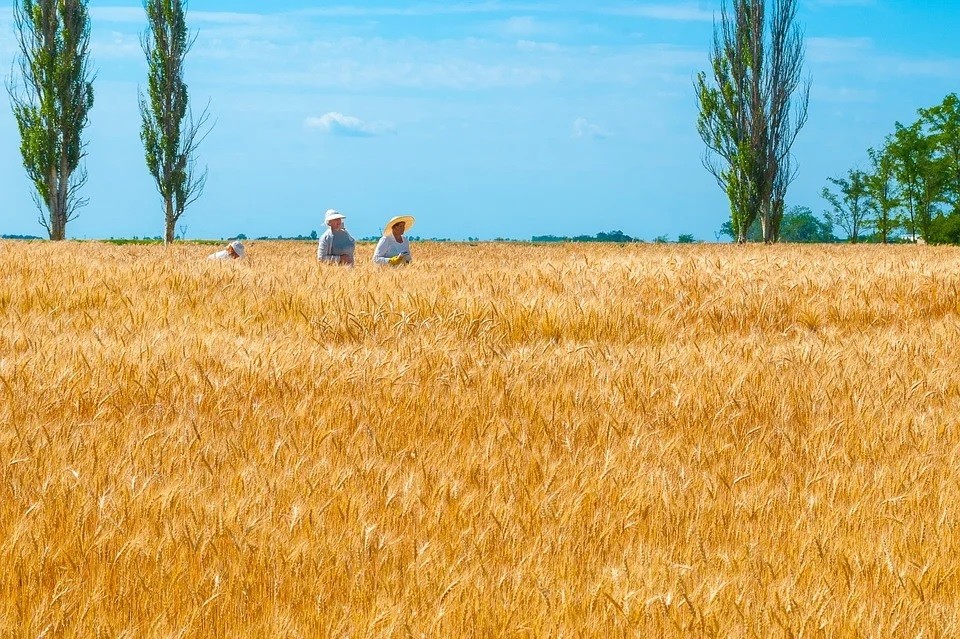 Ukraine - Europe's granary
Ukraine - Europe's granary The thought I cannot drive from my mind is that at the time of the unification of Germany a procession of western leaders reassured Gorbachev and later Yeltsin that while Germany would be invited to join NATO, there was no intention to expand the organisation further to the East. So why, over the last 30 years, have we been doing exactly that? Having given no ground at all in recent talks with Russia about the neutrality of Ukraine, are we really surprised at what has happened? Meanwhile, western media coverage of Ukrainian resistance to Russian columns is generating that mood of false excitement we saw in the early days of the Bosnian war: “there was music in the cafes at night, and revolution in the air.” That Balkan combat, although it was contained (in that case with Russia’s help), turned out to be a grisly three and a half years.
In Kiev today they are handing out rifles to teenagers and our own Foreign Secretary has just made an extraordinarily unwise statement encouraging young Britons to volunteer to fight for Ukraine. That idea won’t looks so romantic in a couple of weeks. The only sensible voice I heard this week was that of Tony Brenton, former British Ambassador to Moscow. While condemning Putin’s indefensible actions, he was hardly surprised at Russia’s policy. And while Putin is a crook, like many crooks he has a backbone. At the end we will be left ringing our hands, making symbolic gestures and dealing with the refugees which already number over 300,000.
“It’s like the Middle East; there’s no solution.” That’s what we usually say when faced with an intractable problem, isn’t it? It seems rather eclipsed now by the Afghanistan disaster, the mess in Ukraine and (assuming you have patience for such trivia) the media-led psycho-drama which British politics has been recently. However, just like the last time, and no doubt the next time, the problem was all in the news again last spring. We saw it on our screens: violence in Gaza, the West Bank, Jerusalem and the rest of it, with diesel-soaked rubber tyres burning, youths with sling shots, security forces with riot shields, tear gas and baton rounds, leading on eventually to rocket firing and air strikes. What do we have at the end of all the strife to pay for several hundred mostly innocent deaths?
Iran and Hamas have once again fired up public opinion around the world on behalf of the Palestinian plight and perhaps to the disadvantage of Israel and the USA. Israel has had the opportunity to kill some Hamas commanders and degrade their tunnels and infrastructure, while demonstrating once more the state’s resolve to defend itself against attack. After the rockets and retaliatory airstrikes, is there anything new at all, anything we didn’t already know? There is every expectation that the dreary cycle will repeat itself sooner rather than later.
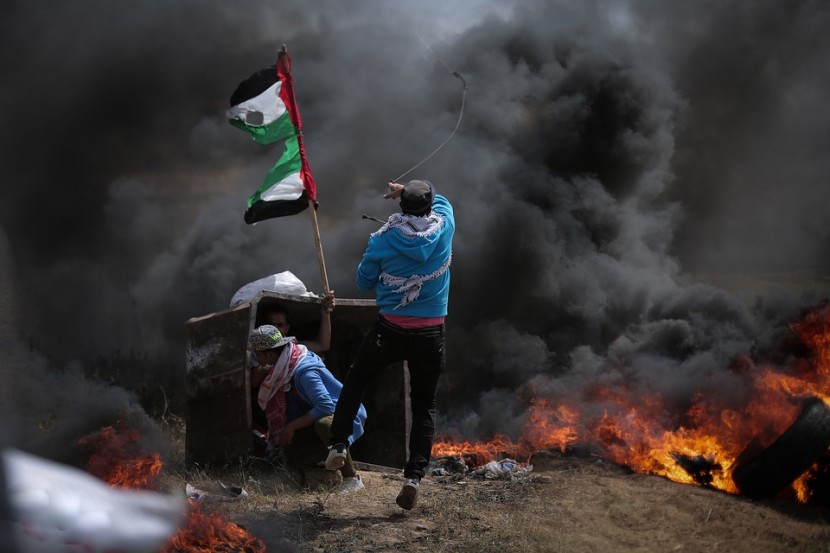 Gaza demonstrations
Gaza demonstrations 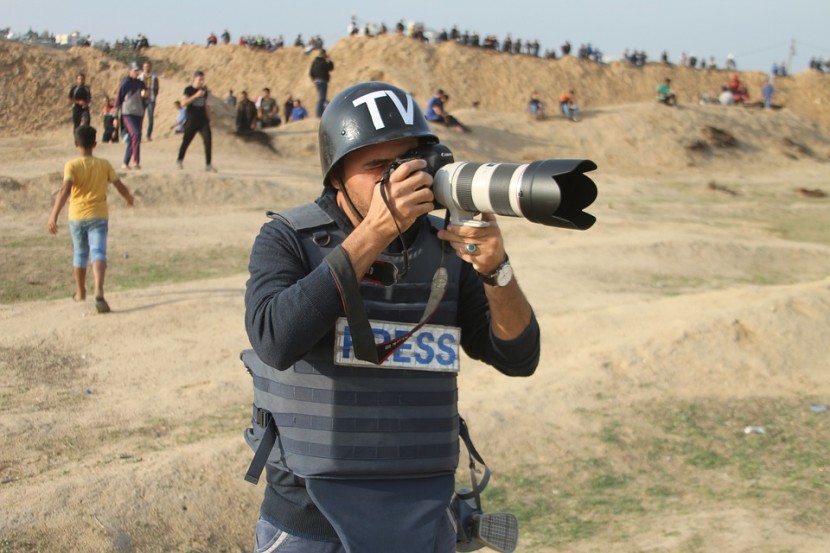 Gaza today
Gaza today The other evening I watched the movie Oslo, which follows a theatre play of the same name, and is a laudable attempt to portray the initially secret negotiations which began in Norway in 1993 and eventually led to the Oslo Accords. It is drama rather than history, but certainly interesting, mostly believable and at times quite moving. There is a particular moment when a Palestinian Arab, faced alone with an Israeli interlocutor in a Norwegian drawing room, suddenly bursts out: “You are my first Jew! I have not met one of you before.” That situation is all too common for both sides in the Middle East, perhaps more so than ever today. In post-war Bosnia I spent five years chairing meetings between Muslims, Serbs and occasionally Croats, trying to find some common ground so that they could live together again. There was plenty of hatred in the air, and it was often expressed in the early stages, but they did at least know each other. To begin with each delegation had to be brought inside an armoured troop carrier to meet on a NATO base; later, in a calmer atmosphere, they would drive themselves to meet in my office. In most cases we got an agreement from days spent in those smoke-filled rooms, later if not sooner. Oslo ends on an optimistic note, with that famous scene on the White House lawn, the hand-shake between Rabin and Arafat, with President Clinton beaming in the middle. You could hardly be so optimistic about the situation 30 years later.
The subject of Israel and Palestine is always a difficult one to raise, because opinions internationally and especially those held in this country, have become so entrenched. And for that reason I will emphasize that what follows is a personal view formed after working in the area for several years. I came to realise then, if I didn’t fully appreciate it before, that the Palestinian leadership runs a very powerful and successful propaganda machine targeting the liberals and especially the churches of Western Europe. Therefore we think we know who the victims are. The Israelis don’t bother with us so much, apart from the occasional visit to restate their position to a usually unsympathetic audience at Chatham House. But invariably they have the ear of the administration in Washington, which is what matters to them.
Personally I have found Palestinians to be the kindest and most hospitable people in the world. They also seem to me to be the worst led people in the world and the worst advised by those should be their friends. By friends I mean their Arab neighbours and also, I am afraid, the likes of you and me who claim to care about them. Since 1948 and the foundation of the Israeli state, the international community has made a series of fundamentally bad decisions about the situation and seems likely to continue to do so. Israelis I have generally found to be polite, correct, and, given their situation, almost infinitely patient. That finding includes the Israeli Defence Force (IDF). A lot of Israeli Arabs, particularly the Druze, take service in the IDF. Perhaps I should state that personally I never saw any incorrect behaviour by Israeli security forces or police, despite working sometimes in very difficult circumstances. By that I am not giving the IDF a clean sheet; I have read the human rights reports and I accept that mistakes are made all the time. British soldiers who have served in Northern Ireland will tell you that peace keeping or peace enforcement is a lot more difficult than war fighting. I did watch a number of Western European civilians, including one clergyman, being escorted on the regular Palestinian propaganda tour around the West Bank, the separation barrier and the checkpoints, and making a point of trying to taunt and insult IDF personnel, cameras at the ready in the hope that they might react.
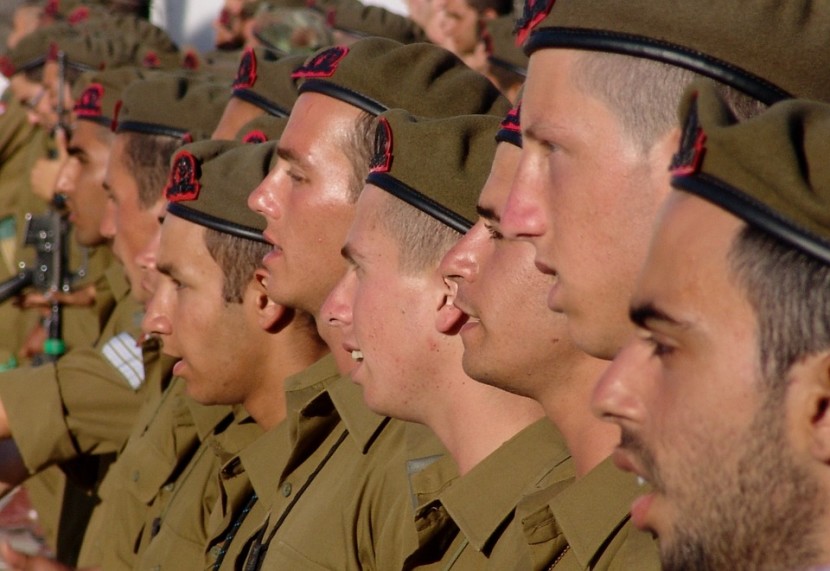 Israeli Defence Force
Israeli Defence Force 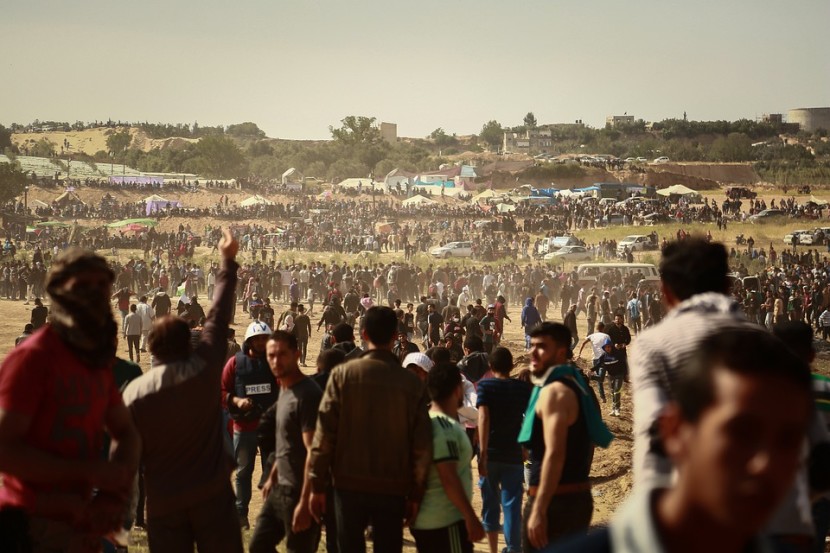 Gaza - youth protest
Gaza - youth protest For a couple of years I looked after aid programmes in what for the sake of simplicity I am going to call the Occupied Palestinian Territories. The main ones were agricultural programmes in the West Bank and three mother and child health clinics in Gaza, all managed and implemented by local Palestinian partners. At the end of that period, I had concluded that our input was doing more harm than good. Some of these programmes had been running for more than 60 years. Effectively it meant that the Palestinian leadership did not need to worry about this particular work for their people, secure in the knowledge that we were doing it for them. Occasionally the western donors would produce some documentation expressing a pious wish that the work would at some point in time be taken over by the new Palestinian Government in Ramallah. For the Palestinian staff and management of the projects, this was all just play-acting; they had neither expectation nor wish that their own government would take over. The status quo was fine as far as they were concerned. They knew exactly where they wanted their monthly pay cheques to arrive from with predictable reliability…in other words from donations provided by you and me and the rest of the outside world.
Truth to tell, their new Fatah-led Ramallah government was hardly impressive and had mainly built itself a reputation for corruption and the construction of privately owned apartment blocks on public land. When we toured the West Bank agricultural programme, a down-trodden official from the Ministry used to tag along with us in an old car. Everybody seemed to ignore him. When I questioned him I found out that our internationally funded organisation was many times larger than his whole department and probably doing ten times as much work in Palestine. It was much the same for the medical work in Gaza; the Hamas-led Ministry wanted to be informed but could contribute nothing. Once I asked some Palestinian friends how they would rate their own government in various fields and we went through the whole list of ministries, none of which scored more than 1 or 2 out of 10 in their opinion. Then we came to education, and they admitted that they had some good universities and reasonably good schools run by the Education Ministry, so 8 out of 10. “Why is that?” I wanted to know. The reply was that education was important and in that case they would not accept anything less. They had no answer for why they were not so demanding with the other ministries.
I had a similar conversation with Gazan friends about why on earth they had just (2006) voted the hard-line Hamas party into power. “It was a protest vote,” they explained. “We wanted to make it plain that we were sick of Fatah’s corruption.” Well, be careful of what you wish for. Since 2006 and without further elections, Iran-backed Hamas has ruled overall in Gaza while their political enemy Fatah sits in Ramallah in the West Bank. For a while something like a civil war developed in Gaza city with adherents from the two factions throwing each other off high buildings. Now you can tell by the flags who controls which blocks. In my time the rocket firing against Israel was developing, although slowly. I had Gazan friends who insisted that it was not happening at all and that it was all Israeli propaganda. “How can you possibly bring a long object like a rocket through a tunnel from Egypt?” an angry Gazan medical consultant once demanded of me? Well, I didn’t know for sure, but in sections or in parts, I supposed. At any rate, the white vapour trails were climbing into the sky and tilting inland towards the nearby Israeli cities of Ashdod and Ashkelon often enough. There were only short range rockets in those days, but even one or two a week which might land on your apartment or on your child while playing in a park is quite enough to bear.
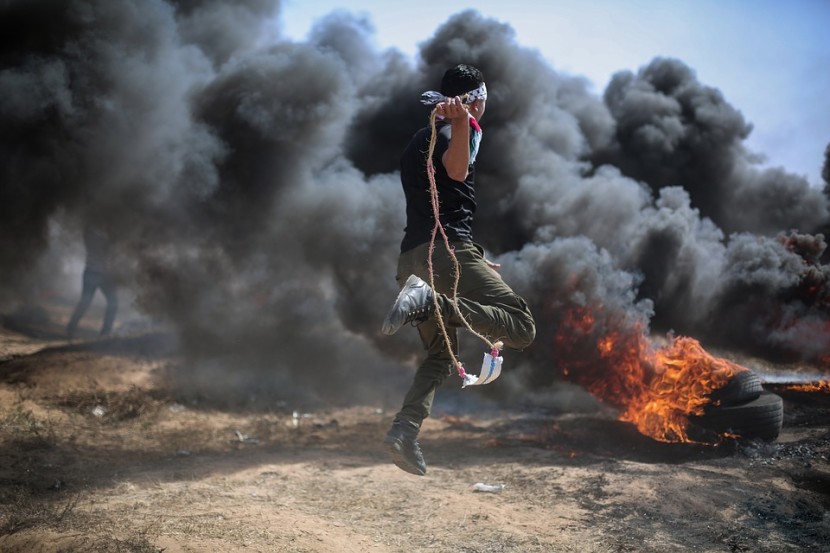 Gaza - on the fence
Gaza - on the fence 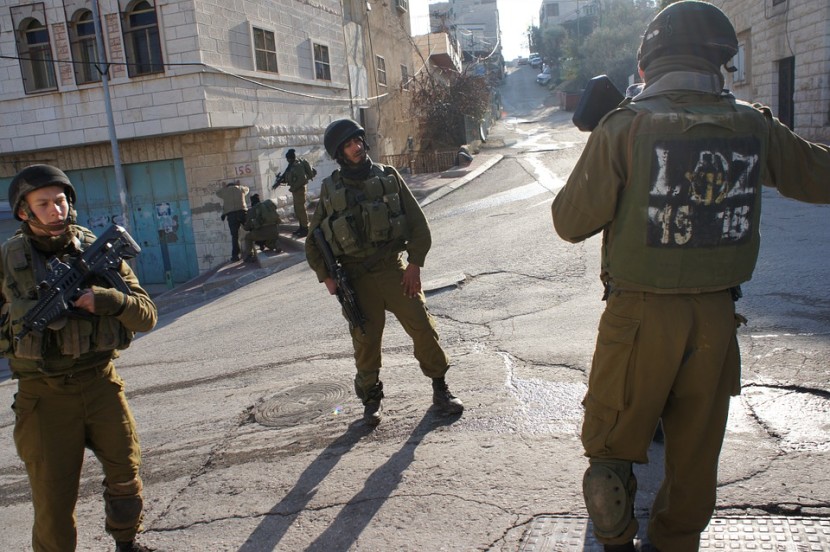 Hebron
Hebron The Israelis have always responded to rocket attacks. I remember a conversation with an NGO staff member who owned a family farm in the countryside near Khan Younis in the south of the strip. While his wife was working too, they could afford to rent a flat in Gaza City, so that they could keep their family there. Now his wife had lost her job, so that she and the children had to stay on the farm. He confided to me his greatest fear: that a Hamas rocket firing team would come to his property by night and launch missiles from the cover of his boundary wall. The Israelis would almost certainly reply with an air strike.
Eyeless in Gaza? I have seen more than one international aid worker legless in Gaza, which has some very nice restaurants along the coast. This is one part of the world where the aid community seems to have abandoned any pretence at neutrality, and some of the NGOs are little more than Palestinian support organisations. At times Gaza seems to be full of annoying young foreigners who have arrived to join an imagined crusade. Local Palestinian NGOs, I suppose, can only be expected to have a natural bias. This should be borne in mind when reading their advocacy statements and reports, particularly in the case of human rights monitoring work. I recall being handed one annual report from a West Bank-based organisation and reading through a long section of what looked like very conscientiously researched violations of Israeli and international law by Israeli security forces and Jewish civilians, settlers etc. Then came a short section headed “Palestinian Infringements.” The cases researched here involved conflict between Palestinian factions, and were usually described as “Incorrect use of weapons.” “What does that mean?” I asked. “What is the correct use of weapons?” “Use for attacks on Israel,” came the reply. My interlocutor didn’t seem to see anything odd about this position and clearly hoped for more funding from international donors.
Life in Gaza and for its 2 million people at that time was more normal than the reports would have you believe, except perhaps for the sight of the armed Hamas fighters standing around on cross roads peering at you through eye slits in black balaclavas. Yes, the hostile actions and rocket firing had resulted in Gaza moving from what had seemed like a useful concession in the right direction by Israel which had withdrawn its security forces and settlers in 2005, to a new role as an enclave in unfriendly territory. It was hardly besieged in the sense that Bosnian Srebrenica, Zepa or Gorazde were. The electricity (supplied from Israel) was normally on; the fuel (supplied through Israel) was normally on sale in the filling stations; the streets were busy with cars; the markets and shops were crowded. Since rocket firing began there was a blockade of course, but mainly of items which could be considered of a military purpose. Building materials were a problem and engineering and electrical items which could conceivably be used in rocket building were also restricted.
I remember many conversations with Palestinians, sad conversations, conversations about what might have been if only times were different. In the West Bank, I never met a farmer who didn’t have some kind of contact with an Israeli wholesaler. These were more accurately potential connections which remained unused. The Palestinian farmers were very good at growing vegetables under plastic and could produce excellent peppers, aubergines, spring onions and even cut flowers. In ordinary times these would have been be cropped, packaged and sent on their way to European supermarkets with despatch. Everybody would make money. But then my interlocutor would shrug his shoulders: “Of course it’s not possible, not with the political situation as it is.” The truth is that there haven’t been any ordinary times since 1948. All these farmers who might have co-operated with Israelis were afraid of their own leadership, afraid of being branded as traitors.
When in Jerusalem, I used to stay in the Sheikh Jarrah district in the guesthouse of St George’s Cathedral. This really is a very pleasant area, just a short walk to the Damascus Gate into the old city and also close to the American Colony, which was once an elegant Ottoman palace, then home to a society of religious Americans in the Holy Land and now a rather luxurious hotel. But this is East Jerusalem, and subject therefore to the efforts of settlers to increase the footfall of Jewish residents and of Palestinian Arabs to resist them. There is nothing more or less than a bit of ethnic cleansing going on here, admittedly not with the gun, but via the courts and the lawyers, but none the less repugnant for that. Arab owners are likely to be offered several times the market value of their property if they will sell to a Jewish settler, or alternately they may find their rights of ownership challenged in court and end up with an eviction. The Israeli judiciary is probably the only independent one in the Middle East, but the pressure to force Arabs out and Jews in leaves a sour taste in the mouth. In fact the Israeli Government policy supporting settlements in the occupied territories is, I believe, the one completely indefensible part of their strategy and even some right-wingers in the Israeli political spectrum would agree with that statement. The harsh reality is however that the longer Palestinians resist signing up to a genuine peace and a two state solution, the less land they are going to control. Meanwhile the propaganda goes on; the alteration of a line or two in a headline or report can give a totally misleading impression about events and the responsibility for them. Take this example: shortly after the last Gaza cease fire came into effect, in occupied East Jerusalem a Palestinian wielding a knife attacked an IDF patrol on a street corner, stabbing one soldier to death and wounding another, before being shot down himself. That is how one media outlet reported the incident. Another outlet simply used the headline: “Israeli Defence Force shoots Palestinian in East Jerusalem.” Neither journalist lied it would seem, but the implications of the two reports are totally different.
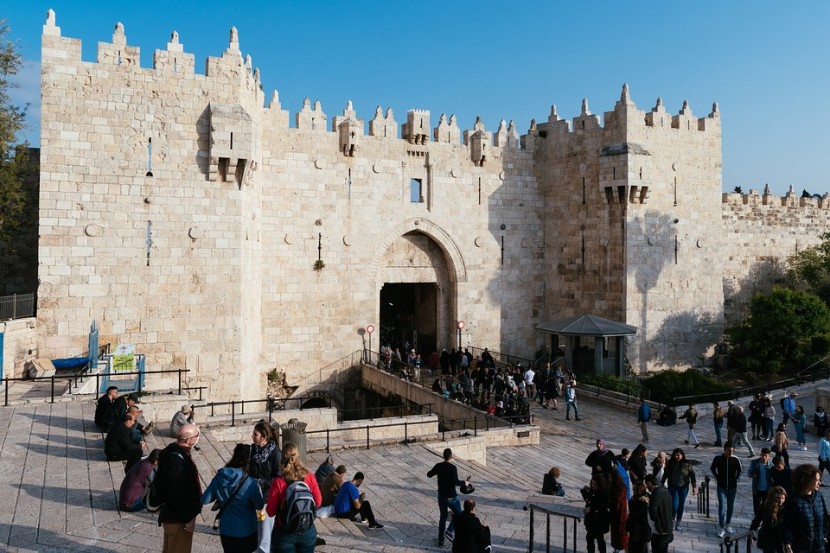 Jerusalem - the Damascus Gate
Jerusalem - the Damascus Gate 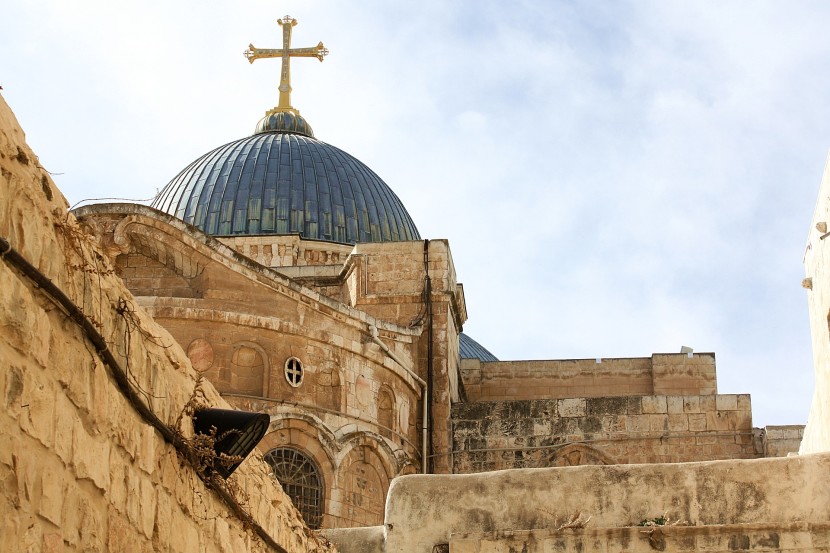 Church of the Holy Sepulchre, Jerusalem
Church of the Holy Sepulchre, Jerusalem A two state solution? Is there any hope for the final aims of the Oslo Accords of 1993 and 1995? Oslo was useful in that the Israeli evacuation of Gaza was agreed. But in my opinion, despite some optimism in the movie, Oslo is now dead and has been for a long time. Ex-British Prime Minister Tony Blair got himself a new job as Middle East Special Envoy of the Quartet (US, UN, EU and Russia) in 2007. All this sounded very grand. One of our Palestinian office managers announced with pride at the time that she had a date to go shopping in Jerusalem with Cherie Blair. I probably disappointed her by replying sourly: “Well good luck! We have surely had enough of them at home in the UK.” Mr Blair, I am afraid, spent the next eight years showing up at meetings with that characteristic grin and achieved precisely nothing at all.
What do people in the Middle East really think and what do they say in private about a two state solution? Israelis, even right wing Israelis influential in the security sector, claim to be ready for it but don’t expect it to happen. This, they say, is because they have no genuine partners on the other side able to deliver peace. In other words, their moderate Arab interlocutors, both in the Fatah part of the Palestinian leadership and in the governments of neighbouring countries, are not able to carry the extremists and the “Arab street” with them. “They say all the right things,” one Israeli security adviser said to me, “even invite me to go on Al Jazeera to express my views. But they can’t deliver. We are ready for peace, but we also know from experience that our survival as a state is dependent on striking back hard when we are attacked.” This gentleman, incidentally, was one of those who oppose the policy of settlement building.
And the Palestinians? Talking privately, I found that there were very few who really believed in a two state solution on anything like the present borders. The most common wish was that all those with refugee status should return to the places which their grandparents left in 1948. This would turn Israel into an Arab majority state, so obviously it isn’t going to happen, not in God’s lifetime or at least while Israel has the support of the USA. Israel would have to lose a war first. To which suggestion one or two would quietly respond: “So what about Iran?” One in particular murmured: “It can only end in fire.” Did they dream of the bomb, every other method having been tried unsuccessfully to destroy Israel? They wouldn’t answer the question. That suggestion is well understood by the Israeli side who make it very clear that a nuclear Iran is completely unacceptable to them and will not be permitted under any circumstances. As we all know, ask an Israeli official about the nuclear status of his own country and he will not reply. But I do now feel some sympathy for one of ex-President Trump’s decisions during which he is said to have asked: “Why the hell do we have to bribe Iran to build a bomb slowly, rather than quickly?” Trump wasn’t always wrong.
Why do I criticise the international community and the friends and neighbours of the Palestinian people? When Israel was attacked by its five neighbours the day after its creation was recognised by the UN, the Israelis within a few days won their first war for existence. Two flows of refugees were created by that 1948 war: approximately 700,000 Palestinian Arabs who felt they could not remain in areas under Israeli rule and a slightly larger but slower flow over the next few years of Jews from states like Iraq, Iran and Egypt into the new state of Israel. Despite leaving their property behind, the flow of Middle Eastern Jews had an easier time of it; by arrangements like Operation Magic Carpet the Israelis eased their passage and rapidly granted them full citizenship rights. You don’t hear much about this second group today, at least not as refugees. Don’t necessarily think of this as a humanitarian action; it was in Israel’s interests to boost the Jewish population.
Meanwhile the United Nations took the decision to grant refugee status to the displaced Palestinians and all their descendants. Remember this was before the Refugee Convention of 1951 and the creation of UNHCR. Nobody seemed to imagine that this would be more than a short-term problem. The United Nations Relief and Works Agency was founded with the sole purpose of looking after Palestinian refugees in the Near East. Today the 700,000 have grown to become more than 5 million. UNRWA today is an organisation run by Palestinians for Palestinians, effectively channelling money collected around the world to run all their social and other services. Again, knowing this work is taken care of, the Palestinian leadership know that they need not trouble themselves about it, and there the matter rests. Another good decision among many bad ones made by ex-President Trump was to defund UNRWA – a decision since reversed by the Biden administration.
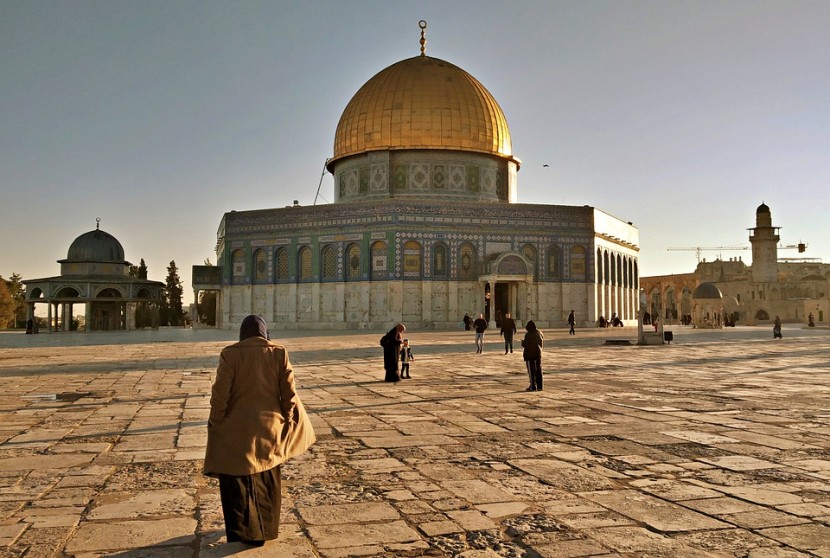 Al-Aqsa mosque at Jerusalem
Al-Aqsa mosque at Jerusalem 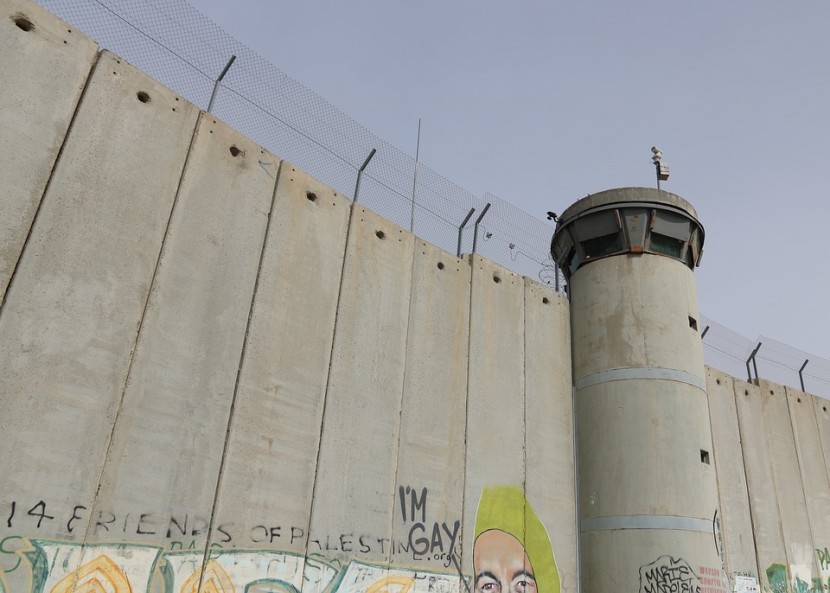 Separation wall
Separation wall Why do I criticise Arab neighbours for their treatment of Palestinian refugees? In fact I do not do so universally and this has nothing to do with whether the neighbouring state recognizes Israel or still considers itself to be at war with Israel. As a good example, take Jordan which has given Palestinians almost full citizenship rights and where in fact they form a majority over the founding Bedouins. Jump into a taxi outside Amman airport and it is likely to be driven by a Palestinian who will tell you all about it. Contrast this with Lebanon, a country with a large and wealthy middle class, where Palestinians are kept securely fenced off from the benefits of citizenship. They must live in separate camps, and use separate hospitals and schools (funded by UNRWA and therefore by you and me). They may not vote; they do not have access to Lebanese universities; they may not work in most of the professions and they are effectively restricted to agricultural labouring. Why has this state of affairs continued for more than 70 years? Because the status of Palestinians in Lebanon is still claimed to be temporary, as their supposed future is to return to their grandparents’ roots in Haifa or Tel Aviv. And of course that is not going to happen. Small wonder that the camps of Lebanon are breeding grounds for extremism and I would argue that the Lebanese treatment of Palestinians, most of them born in Lebanon over a period of 70 years, is much more of a disgrace than the Israeli blockade on Gaza.
Why do I criticise friends of Palestinians although I do consider myself one? Because it is not a kindness to avoid telling a friend the truth and constantly to reinforce his own sense of victimhood. The Palestinian leadership’s propaganda campaign does quite enough of that without the rest of us chipping in. My own view is that Palestinians need to make a deal, a sensible, unemotional and pragmatic deal, which will give them as much of a state as they can now manage to achieve. Because so much time has passed since Oslo, they have probably missed the chance to have East Jerusalem as their capital. They should save what they can out of the mess, before any more settlements are built. I’m not particularly optimistic about this, but I see no other way for them to break through to a decent life for their people. However, there is a cynical joke about the leadership which is often repeated around the Middle East: “The Palestinians never miss an opportunity to miss an opportunity.”
So then who is to blame, a new and unprejudiced arrival to this planet Earth might be heard to ask, for the mess which is the Middle East today? Well, this is an ancient place and an ancient tragedy. Blame the Judeans for being an unruly and rebellious part of the Empire; blame the Romans for expelling them from their homeland; blame European kingdoms of the Middle Ages for the persecution of Jewish communities down the centuries; blame the Tsarist pogroms in Russia; blame the British for promises made to Zionists during the Great War; blame the Nazis and fascist fellow travellers for the holocaust; blame the Irgun and Hagenah for running an effective terrorist campaign during the British Mandate; blame the United Nations for certifying the new state of Israel but failing to deal with the aftermath of the war which followed; blame the neighbours for subsequent wars against Israel which they failed to win; blame the manipulation of world opinion by an often biased media and above all blame the cynical manipulation of refugees by Arab leaders for political purposes. Does any of this help? Not really.
When I first visited Jerusalem, I met an elderly Swede who had lived in the holy city for nearly 30 years. Sensing I might gain some wisdom from this source, I asked him to explain his views on the problem? He started off by saying he didn’t accept there was a problem. “This land is not over-populated,” he avowed. “There is in fact room for everybody. And they are such similar people, essentially hard-working, good family people and equally good business people. So many opportunities are being missed while we quarrel.” I seemed to remember hearing similar remarks about Cyprus.
Jerusalem is a wonderful old city with its ancient walls and seems never more so than while living in pleasant Sheikh Jarrah, loitering in the sunshine around the Damascus Gate or exploring the souks. But has this place, perched high among dry and rocky hills, ever been anything but an apple of discord? The bloody violence of the crusades was about nothing more or less than who controlled it. In fact when William Blake wrote his famous hymn And did those feet in ancient Time, he was describing not this ancient city, but a New Jerusalem, a “heaven on earth” which was instead to be built in England’s green and pleasant land. Mark Twain arrived here as an early tourist on a steam ship from San Francisco just after the American Civil War. He made it fairly clear that he was disgusted by the commercial exploitation of the holy sites, although more religious members of his party were duly impressed. Even the Christians had difficulty in sharing the Church of the Holy Sepulchre, despite efforts by the ruling Ottoman Turks who saw it as their role with the Status Quo agreement to mediate access to all the religious sites. The Cretan philosopher and traveller Nikos Kazantzakis wrote of it: “Latin, Greek and Armenian priests crossed paths without speaking; Christ in their hands had become a flag of hatred.”
Some moments in Palestine were memorable for being without stress and just rather wonderful. There was a visit I made early one winter day to lonely desert hills towards Beersheba. The partner was showing me some projects by which Bedouin wells which had been blocked during the 1948 war were being re-opened for the use of herdsmen. As usual with the Bedouin, quarrels immediately ensued about which families had the right to use the wells now. The partner’s programme manager was trying to insist that if the NGO opened the well, it must be for everybody’s use. As the Bedouin did not really understand that concept, he had his work cut out, but he was making some progress. In actual fact I had not approved in advance this particular use of the money, but I felt then that we should approve. It was what anglers call a “soft” kind of a day. A low winter sun was breaking through the clouds to illuminate grey hills and rock doves were cooing. We turned back to the car and drove back into town and I was glad to have seen it all.
The last time I left Gaza must have been in 2007. It was by the Erez Crossing and the journey between the two sides is a rather unfriendly one. This involves a walk across a no man’s land between the terminals consisting of some hundreds of yards of red mud churned up by tracked vehicles. Occasionally a helicopter chatters up and down outside the fence. There always seems to be activity by Israeli trucks and bull-dozers seeking to destroy tunnels and bunkers beneath the surface. Once in the Israeli terminal you will find yourself in an area bounded by bomb-proof glass through which the officials watch you and talk to you through speakers, guiding you through a system of scanners. If you know the history of suicide vests, car bombs, random stabbings and other events, it is quite easy to understand why this should be so. The Israelis are good at security and tend to give the checking tasks to young girls doing their national service as being more diligent than the boys. That is fine with me; I used to make a point of flying El Al in the Middle East, as I was more confident there wouldn’t be a bomb on the aircraft. On this occasion we had waited for half an hour to get the signal to cross from the Israeli side, along with some Gazans who had exit permits for specialist medical treatment and for family visits. As we made our way with our luggage across the red earth track, an IDF tank came ploughing its way in the opposite direction through the mud, a teenaged soldier grinning and waving from the open turret. When it was past us, still heading in the direction of Gaza, there was a sudden crack-boom as it fired an unexpected round at point-blank range into a low wall. When a tank fires its gun within 20 yards, believe me you find yourself lying flat on the ground without knowing quite how you got there! I realised that the tank crew’s purpose had been merely to knock down the wall, presumably as it was seen as a potential firing cover or threat to the terminal on the Israeli side. Rather gingerly we got up with our ears ringing, dusted ourselves down and carried on to the terminal.
Well, if I was a religious man you could describe that as a belated Christmas piece about the Holy Land! Better by far to go fishing. Let’s hope we all have an easier year in 2022. Given the extended flood we have just experienced, I would think that any early salmon coming into the Wye would have had a chance to run well upstream. I might make a tentative bet on the upper/middle section of the river for the first springer, perhaps between Hereford and Glasbury? Let us hope so; we deserve a better season this time. Meanwhile the Usk in particular is just approaching a viable level for early spring trout fishing. However, more rain is predicted as we turn into March and there are three more days to wait. Keep watching the gauges and tight lines when you do get started!
Oliver Burch
Please note that the views within this report are the author’s and do not necessarily reflect those of the Wye & Usk Foundation.
